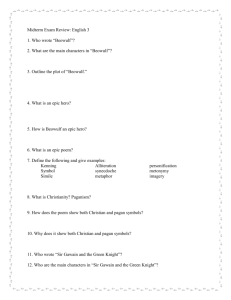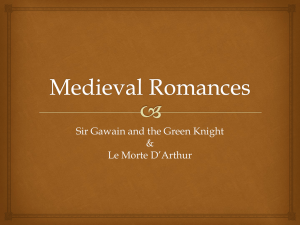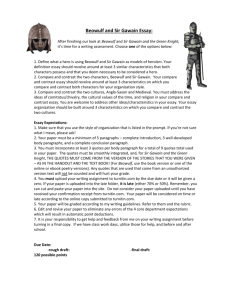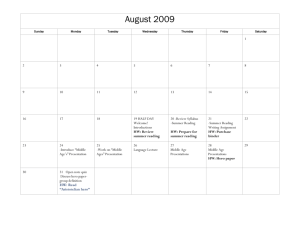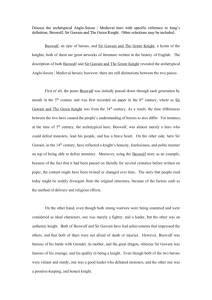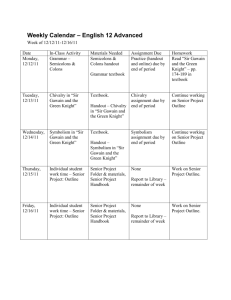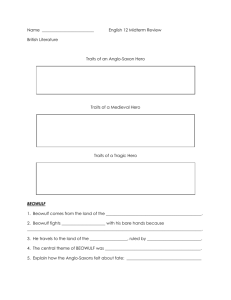Critical Essay - Blogs @ Butler
advertisement
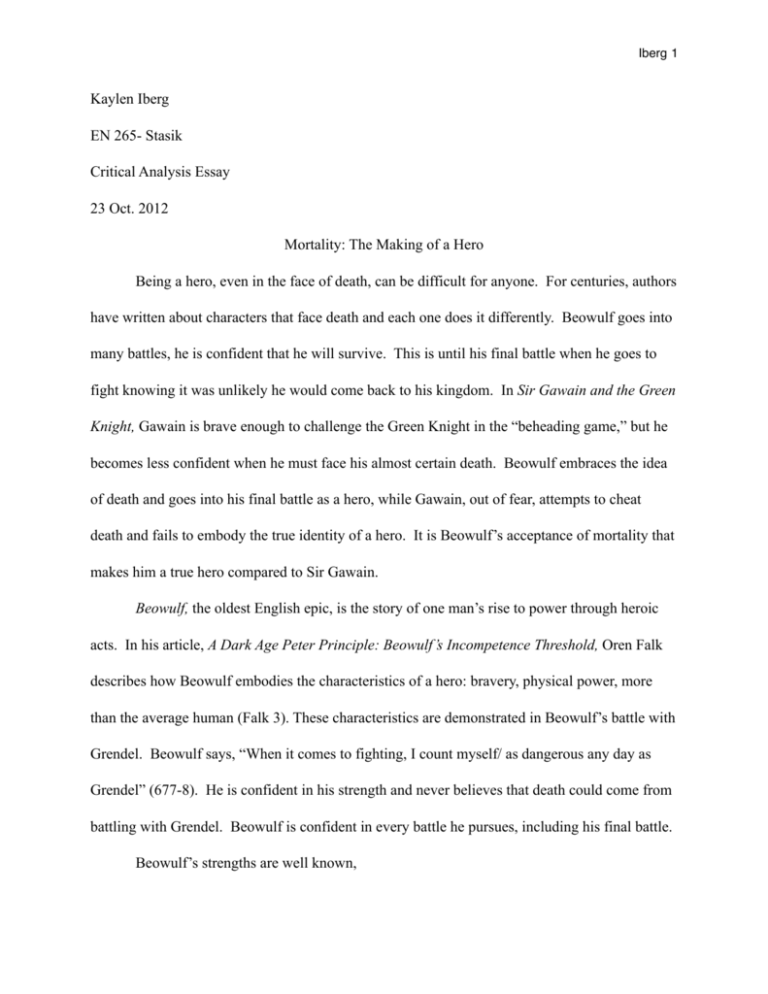
Iberg 1 Kaylen Iberg EN 265- Stasik Critical Analysis Essay 23 Oct. 2012 Mortality: The Making of a Hero Being a hero, even in the face of death, can be difficult for anyone. For centuries, authors have written about characters that face death and each one does it differently. Beowulf goes into many battles, he is confident that he will survive. This is until his final battle when he goes to fight knowing it was unlikely he would come back to his kingdom. In Sir Gawain and the Green Knight, Gawain is brave enough to challenge the Green Knight in the “beheading game,” but he becomes less confident when he must face his almost certain death. Beowulf embraces the idea of death and goes into his final battle as a hero, while Gawain, out of fear, attempts to cheat death and fails to embody the true identity of a hero. It is Beowulf’s acceptance of mortality that makes him a true hero compared to Sir Gawain. Beowulf, the oldest English epic, is the story of one man’s rise to power through heroic acts. In his article, A Dark Age Peter Principle: Beowulf’s Incompetence Threshold, Oren Falk describes how Beowulf embodies the characteristics of a hero: bravery, physical power, more than the average human (Falk 3). These characteristics are demonstrated in Beowulf’s battle with Grendel. Beowulf says, “When it comes to fighting, I count myself/ as dangerous any day as Grendel” (677-8). He is confident in his strength and never believes that death could come from battling with Grendel. Beowulf is confident in every battle he pursues, including his final battle. Beowulf’s strengths are well known, Iberg 2 A crew of seamen who sailed for me once with a gift- cargo across to Geatland returned with marvelous tales about him: a thane, they declared, with the strength of thirty In the grip of each hand” (377-381). Beowulf has proven his strength and bravery which allows him to boast being a hero. When he gets older, Beowulf’s courage and commitment to his country is still intact (Falk 5). Even in his old age, Beowulf personifies the word hero by focusing on the betterment of his people and the continuation of his people. Beowulf uses his physical power to save his kingdom and the acceptance of his humanity to spare his warriors. In Sir Gawain and the Green Knight, Gawain tries to be heroic, but he makes several mistakes to show that he is not a true hero. When the Green Knight enters the hall he challenges the room to the beheading game, no one stands up except for Gawain. He claims, I am weakest of your warriors and feeblest of wit; loss of my life would be least lamented. Were I not your nephew my life would mean nothing; to be born of your blood is my body’s only claim” (i. 354-7). At the time, he seems like a hero, he is sacrificing himself because he believes that he is the least valuable. In his essay entitled, Sir Gawain and the Green Knight: An Essay in Enigma, “That there would be no Green Knight to cut off his head next year if he did his job properly?” (Pearsall 5). Had Gawain been more understanding of the challenge he could have spared himself, but out of fear and lack of confidence he is unable to yield a fatal blow. The Iberg 3 Green Knight establishes the rules, Gawain must seek him out to receive “the same blow as you’ll dole out today,” (i. 396-7). Later, Gawain makes sure that he has an unfair advantage. So, this action of standing up is not as noble as it seems, he does not accept death, he thinks he ultimately has a chance to survive. Gawain lacks the confidence and the physical ability exuded by most heros. Unlike most heros, Gawain does not understand the choice that he has made. Gawain and the rest of King Arthur’s court fail to realize the threat the Green Knight poses to Gawain in the coming year (Pearsall 5). The problem is that Gawain blindly accepts the Green Knight’s challenge and does not fully understand the consequences. Carl Grey Martin has made the argument that the Green Knight is more chivalrous than Gawain (Martin 1). Although the Green Knight, is more of the villain, he is honest and fair. The Green Knight is more of the idealized hero in physical form and he proposes the beheading game in a fair way. Martin then suggests that the Green Knight is an exaggeration of late medieval mercenary (Martin 1). On the other hand, Gawain never exemplifies those qualities. He is able to deny the Bertilak’s lady advances but he never shows the same prowess in a battle setting. These two characters seem to be willing to put their life on the line for their country, but that is not what makes a hero. Beowulf has the courage and confidence that he will survive the battles. Whereas Gawain lacks the courage to fight; he offers himself up like a lamb for slaughter. Courage to win is the main feature of a hero because that is a primary characteristic to face the dangers that they must protect their people from. Beowulf is a primary example of a hero because of his courage when facing the dragon in his final battle. Iberg 4 Beowulf spoke, made a formal boast for the last time: ‘I risked my life often when I was young. Now I am old, but as king of the people I shall pursue this fight for the glory of winning, if the evil one willy only abandon his earth- fort and face me in the open’” (2510-5). In his old age, Beowulf is willing to risk his life. He understand that he is older and more likely to be killed in battle, but as the king he says that he will risk his life again. Some could mistake Beowulf’s decision to battle the dragon as selfish and only for individual glory, but he is more of a martyr because he sacrifices his own life (Falk 7). Beowulf fights the dragon to preserve his country and he understands that he may not survive this battle. Beowulf fought the dragon until his death and then in his last moments he relinquished control to Wiglaf. His selfless death for his country proves that he is a hero. He did not try to avoid his impending death, he simply did what he had always done. In Sir Gawain and the Green Knight, the knight, Gawain, is almost ready to accept his impending death, until he is given the chance to ensure his safety. Upon the receiving of the girdle, Gawain’s first thought is to not accept it, that is until he finds out it’s protection powers. The Gawain poet writes, The man mulled it over, and it entered his mind it might just be the jewel for the jeopardy he faced And save him from the strike in his challenge at the chapel. With luck, it might let him escape with his life” (iii. 1855-8). Iberg 5 Gawain is immediately grateful that he has a way to save his life, the one he once deemed unimportant. He plans on using it when he meets the Green Knight again, he has not accepted his impending death, he is afraid. This act is not heroic, trying to spare one’s life by means of cheating is cowardly. The idea of mortality has not yet been accepted by Gawain and for this he finds a way that to ensure his safety. He wears this girdle when the Green Knight finds him, and knowing the power of the girdle is not enough, “But glimpsing the axe at the edge of his eye/ bringing death earthwards as it arced through the air,/ and sensing its sharpness, Gawain shrank at the shoulders” (iv. 2265-7). Gawain is afraid of the axe even though he knows that he cannot be hurt while wearing the girdle. The inability to embrace his humanity displays Gawain’s unheroic character. A hero receives honor when he or she is able to march into battle accepting the possibility of death. In his article Beowulf: The Archetype Enters History, Jeffrey Helterman writes, “Beowulf determines his own fate” (Helterman 5). In each battle he accepts his potential death but is so confident in himself that he believes that he will survive. In his old age Beowulf must rely more heavily on his sword, armor and shield (Helterman 16). Beowulf’s decision to sacrifice himself immortalizes the memory of him. He does not become a coward and run from the battle with the dragon, instead he fights even after he has been fatally wounded. The bravery shown by Beowulf is not extended to Sir Gawain. Through his cowardice Sir Gawain proves he is not a hero. Sir Gawain took the challenge of the beheading game, yet he decided to cheat when his life was on the line. Death is an extreme consequence but a true hero is unafraid of death. A true hero, like Beowulf , is focused on the betterment of his people. Gawain’s believes that by offering himself to the Green Knight he will seem more noble and Iberg 6 more deserving of a place on King Arthur’s court. Gawain had taken this challenge for the Court of King Arthur, yet he did not complete it with the nobility that the court deserved. He used an enchanted girdle to secure his life. The ability to accept mortality is a primary trait in a hero. Beowulf’s ability to understand his impending death shows that he is indeed a hero, whereas Sir Gawain, never accepts the possibility of his death. The idea of mortality is difficult to bear, but a hero will put their life on the line. A true hero, like Beowulf, will use his position and courage to accept the potential to end his life. A coward, like Sir Gawain, will find any way to cheat death. When Sir Gawain accepted the girdle his chance to be a hero expired. Beowulf was able to greet death as a hero and provide protection for his people. Mortality is tricky to understand but even more difficult to accept, but a true hero can accept his end and stand noble even in the face of death. Iberg 7 Works Cited "Beowulf." The Norton Anthology English Literature. Ed. Stephen Greenblatt. 9th ed. Vol. 1. New York: WW Norton &, 2012. 41-108. Print. Falk, Oren. "A Dark Age Peter Principle: Beowulf's Incompetence Threshold." Early Medieval Europe 18.1 (2012): 2-25. EBSCOhost. Web. 20 Oct. 2012. Helterman, Jeffrey. "Beowulf: The Archetype Enters History." ELH 35.1 (1968): 1-20. JSTOR. Web. 26 Oct. 2012. <http://www.jstor.org/stable/10.2307/2872333>. Martin, Carl G. "The Cipher of Chivalry: Violence as Courtly Play in the World of "Sir Gawain and the Green Knight."" Chaucer Review 43.3 (2009): 311-29. EBSCOhost. Web. 20 Oct. 2012. Pearsall, Derek. ""Sir Gawain and the Green Knight": An Essay in Enigma." Chaucer Review 46.1/2 (2011): 248-58. EBSCOhost. Web. 20 Oct. 2012. "Sir Gawain and the Green Knight." The Norton Anthology English Literature. Ed. Stephen Greenblatt. 9th ed. Vol. 1. New York: WW Norton &, 2012. 186-238. Print.
